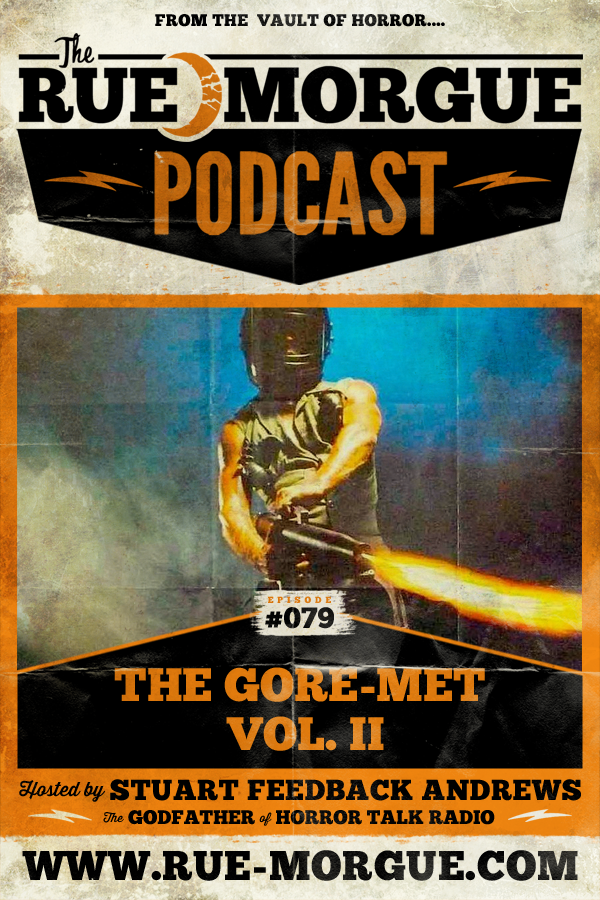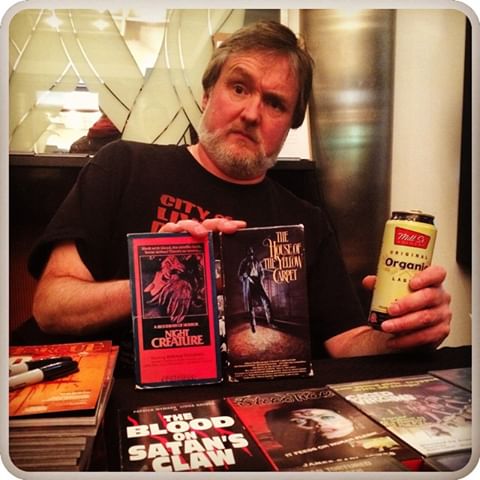
In July 2019, presumably before SARS-CoV-2 ever made it to these Godforsaken shores, the beloved Canadian horror journalist Andrew Bailes (a.k.a. The Gore-met) died of a sudden respiratory illness that took his friends and family completely by surprise. I spoke with him on the phone just a couple of weeks before he went into hospital and there was no mention or sign of any illness so as you can imagine, the news came as quite a shock.
Seven years earlier, in September of 2012, when we were all still semi-young and I was the host of a horror podcast, I invited the Gore-met to drop by the Rue Morgue Studio of Eternal Disappointment for an epic interrogation into the warped mind and methods of this peculiar character. I reissued Vol. I of that interview not long after he passed and had intended to unleash the second instalment soon after, but listening to it again years later, I’ve been going back and forth about whether or not I want to circulate it again. This episode, due to random reactions elsewhere, inadvertently became one of the most controversial instalments in the short, unhappy life of the Rue Morgue Podcast. Huge sections of it bring back some wild and wacky memories, not all of them pleasant either.
But as I prepare to start repackaging some of my older interviews for the long-threatened Cinephobia Radio reboot, and as tribute to a fallen comrade and a Canadian icon of blood & guts & beer & boobs, I figure what the hell, I’ll put it again; however, if I’m gonna give life to this once more, it requires a bit of commentary and context. So for anyone curious about the sordid and scandalous, behind the scenes tale of this particular episode, buckle in and let me take you on a bumpy ride through the Chone-O-Sphere, to a time when legends walked the Earth and social distancing was a secret power only practised by a chosen few.
While we were never super close, I considered the GM a friend, and after I parted ways with the magazine, he was the only one associated with that enterprise whom I remained in any sort of regular contact with. If you didn’t know what our relationship was like behind the scenes, and only caught wind of one of our numerous vitriolic, online battles, you wouldn’t be crazy to assume we were bitter enemies. We used to fight viciously, especially when the subject turned to politics, but usually after one of those spats, we’d quickly shrug it off and go back to privately making fun of each other again.
Admittedly, I’m not the easiest person to get along with but neither was the Gore-met. He was a provocative bugger who liked to press buttons, and he seemed to enjoy pressing mine, and I probably never failed to give him the reaction he was looking for. Ten years later, I’m much more mellow these days. It’s not that I’ve matured, it’s just that I’m burnt out and don’t have the energy.
But there were a couple of moments between me and the GM that got pretty gnarly. One in particular happened in the Summer of 2011, shortly after Andrea Subissati appeared on the show. Ms. Subissati is currently the editor of Rue Morgue Magazine but at the time, she wasn’t a well-known personality in the horror zone although she was very ambitious and eager to get involved. One of the previous editors of Rue Morgue, the tattoo-plastered, bright red-haired, platform boots wearing Jovanka Vuckovic invented the role of the celebrity, Rock & Roll female horror journalist that inspired an entire crew of up and comers to follow in her wake, with many of them taking on self-annointed, “spooky” nicknames. Andrea “Hellbat” Subissati was one such character, although in contrast to many of her contemporaries, she seemed to possess a more compelling, academic edge. She’d published her master’s thesis, When There’s No More Room In Hell: The Sociology of The Living Dead and had come on the show to talk about it, which proved to be one of the better episodes in the podcast’s relatively short run.
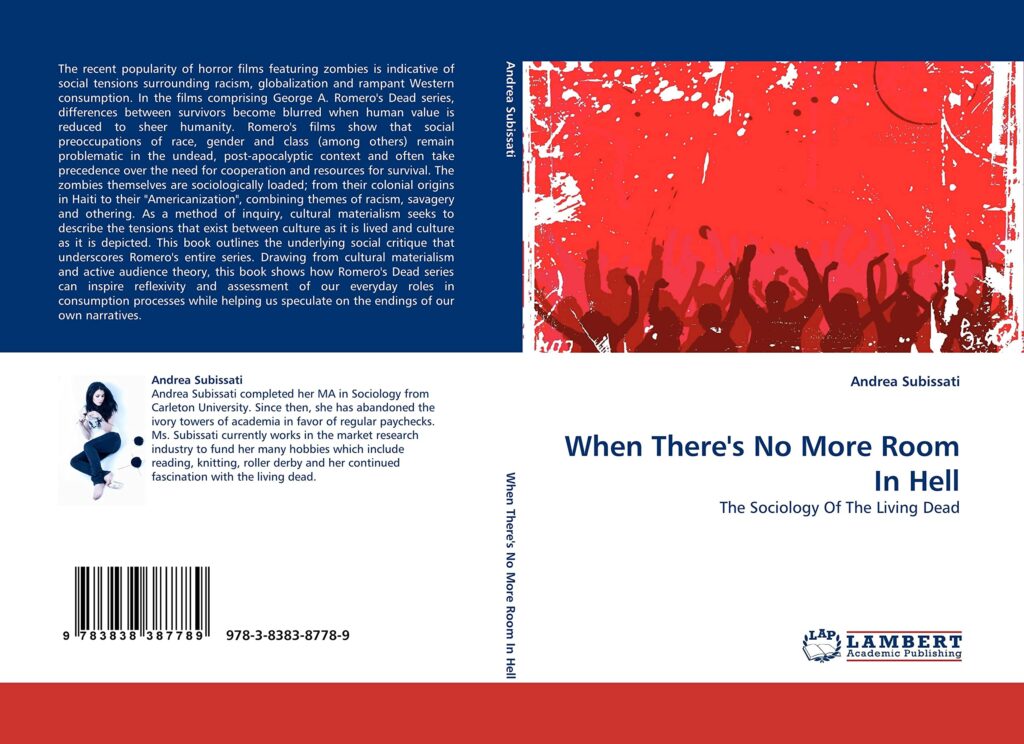
After the success of her first appearance, I invited Andrea back to the Rue Morgue Studio of Endless Misery and Dashed Hopes to record a follow-up that generated a fair bit of controversy and set into motion a chain of events that none of us could have anticipated.
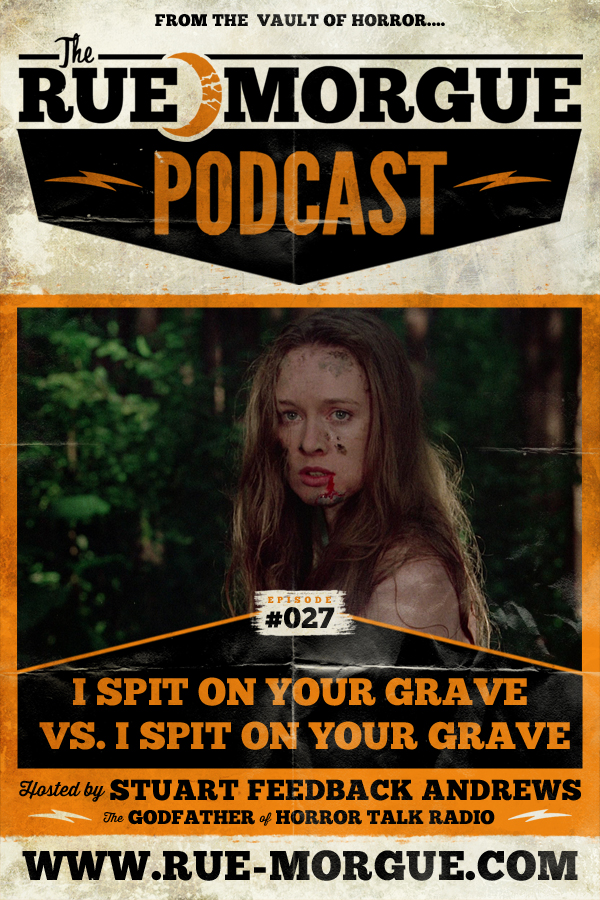
As the title suggests, we conducted a compare and contrast between Meir Zarchi’s 1978 classic with the lamentable Steven R. Monroe 2010 remake. I’d always had issues with the original, not because I’m squeamish or easily offended by the subject matter (don’t worry, Nipple Dippers, I’m not a Snowflake!), but I always felt there was a core of dishonesty in its intent. After comparing it to the godawful remake and with the benefit of Andrea’s perspective, I came away with a more favourable view of the original and a better understanding of how men and women tend to watch these films differently. (On a subsequent episode, I talked to horror journalist Kier-la Janisse about the same issues related to the film, all of which were featured in her book, House of Psychotic Women).
Despite any of its positive attributes, I still feel that Zarchi’s film masquerades as a triumphant depiction of female empowerment in order to wallow in the titillation of rape and humiliation while pretending to be virtuous, not unlike how the old Swedish softcore films transparently pose as cautionary tales of what could happen to your teenage daughter if you sent her off to a private boarding school.
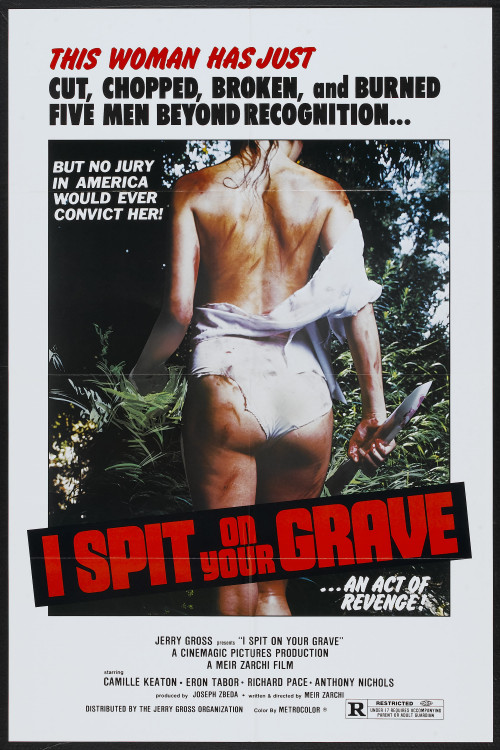
What inspired Andrea and I to investigate this topic was that a young, relatively unknown horror journalist wrote a blog on the Fangoria website where she dared criticize the remake. That individual went by the name of Lianne Spiderbaby who at that time had not yet achieved worldwide infamy. For those who don’t know the story, Lianne was an aspiring horror journalist from Toronto who became romantically entangled with Quentin Tarantino. As a result of such a glamorous connection, her career skyrocketed and she set her controls for the heart of the sun, that is, until it was revealed that she was a serial plagiarist of astonishing proportions. She then disappeared from the pop culture firmament as quickly as she had blasted into consciousness—cancelled before cancel culture was even a thing.

But it was that Fango blog that brought Lianne to my attention (ironically, as with most of her work, the piece turned out to be largely plagiarized) and not because of the quality of her arguments (I forget what the critiques were exactly), but due to how viciously a legion of angry, young male horror fans responded to them in the comments section. This came along at a time when my frustration with a growing contingent of borderline, incel-esque Nipple Dippers (a particular breed of intellectually diminished reactionaries) in the horror fandom sub-culture was reaching a boiling point.
In recent years, my tolerance for the Dippers has improved, largely because my intolerance for their opposite number has intensified. Of course, I’m talking about the faux-progressive, sanctimonious, cancel-culture finger waggers, the Gibbleheads.
But at the time, it seemed like a worthwhile endeavour to address this misogynistic backlash against Spiderbaby (sorry, Dippers, I’m using some Trigger terms there!), hence the genesis of the podcast with Andrea.
While many seemed to dig the episode, there were a few who were annoyed with it but none more than the Gore-met himself, who believed we were doing a lot of politically correct, self-satisfied virtue signalling (although we weren’t really using that term back then). Commenting on the Rue Morgue blog and being the rattlesnake-poking provocateur that he naturally was, he launched an infamous attack on both Women in Horror Month and Lianne Spiderbaby that was unfortunately, guilty of the very thing we were criticizing in the first place.
His comments about Spiderbaby focused on the seductive attire she wore in her videos and the heels she “tottered” about in at horror conventions. Essentially, he was “slut-shaming” her, right at a time when the Men’s Rights Movement was picking up steam, although still a couple of years before Elliot Roger went on his infamous kill crazy rampage. Those two occurrences alone shine a light on why it seems necessary to have conversations about these regressive attitudes and why we felt discussing them had relevance.
But keep in mind, this was a few years before the #MeToo movement that, with its witch-hunt mentality and complete disregard for any reasonable standards of due process, would make a mockery of a lot of rational discussion on these issues.
Ten years ago, when we recorded this, I don’t recall the term “Woke” being used in common parlance. If it was, I wasn’t paying attention. I first caught wind of its repetitive use during the 2016 Clinton campaign when many of her supporters loudly declared their allegiance to this new-fangled, mainstream version of political correctness. Since then, the culture wars have intensified beyond any reasonable hope of bridging perceived gaps between polarized, ideological misunderstandings. The modern Corporate Superstate-executed tactics of divide and conquer are now so precise that I’ve heard even trans activists arguing amongst themselves about what the correct terminology is to describe each other. Meanwhile, Raytheon, Exxon and Pfizer couldn’t give a fuck about gender neutral bathrooms, although they love the fact that we’re fighting amongst ourselves over them.

But I digress.
With respects to the Gore-met’s criticisms of Women in Horror Month (and not everything he said was completely unfounded), one area where we fundamentally disagreed was in the necessity of observing such a month in the first place.
Back when Cinephobia Radio was on CKLN and long before anyone ever mentioned a Women in Horror Month, we were encouraged by the station managers each year around International Women’s Day to focus our programming in that direction. One year, I did a five-part series on women in porn that got a lot of tongues wagging around town, but on another occasion, I brought Jovanka Vuckovic into the studio (long before she ever became the Editor-in-Chief of Rue Morgue) to talk about some of the pioneering women of horror cinema. The problem is, there were so few notable female horror directors by that point that it was difficult to come up with a very compelling list.
My roommate at the time was trying to break into the world of prosthetic makeup effects, an area of the film business traditionally dominated by men, so I was seeing with my own eyes the struggles a young woman faced trying to break into that industry. It’s a boy’s club and a lot of men don’t like to admit that, for the same reasons you’ll rarely find a bigot who’ll admit to being a bigot. There’s an explanation for all of this but that’s another discussion for another time. Nevertheless, these reasons alone illustrate why, in theory at least, the idea of a Women in Horror Month could serve a legitimate purpose.
All of this sets the stage for the episode I’m sharing with you today. Vol. II of my interview with the Gore-met is where we dive headlong into these issues and revisit the fallout from his infamous Spiderbaby comments from the year before. Unfortunately, Lianne herself listened to the episode and was extremely upset with me about it.
Sadly, for this impressionable young woman, her editor at Fango at the time, Chris Alexander, convinced her that the entire thing was designed by me as a deliberately planned, passive-aggressive attack on her, and that I was digging up the issue again for no other purpose than to undermine and humiliate her (for some mysterious reason).
To explain to you how ludicrous an assertion this was, keep in mind, this was long time before the plagiarism issue ever came to light. To this day, I’ve never met the woman, and other than her Fango blog and certain comments the Gore-met himself made online, at the time of this recording, I knew very little about her beyond her association with Mr. Tarantino, a filmmaker I admire greatly.
I’d even had one or two exchanges with her online where she claimed to be a fan of my show so if anything, I was flattered by the comments. And while it was plainly obvious to anyone with half a brain (therefore, not at all obvious to most) that she was exploiting the Tarantino connection to leverage her own profile and influence, I had no personal axe to grind with her myself. In my mind, she was someone who had been unfairly attacked on both the Fango and Rue Morgue blogs and if anything, I felt I was sticking up for her.
But as much as I tried to explain all of this, I couldn’t talk her down off the ledge. She was convinced it was all a vindictive act. In truth, I’m not against doing something vindictive if the occasion calls for it but at this point in time, Lianne had done absolutely nothing to deserve any mistreatment from me. A mutual friend of ours tried to calm her down but she was completely beyond reason and proceeded to make unfriendly comments about me on her social media profiles, which of course, created a resentment where there was none previously.
I wanted to comment more explicitly about this on the show but there were politics at work and it didn’t seem right to drag Rue Morgue into a war with Fangoria over a personal issue I was having with a contributor and their editor who was a former colleague, a former friend and once upon a time, my Caustic Critic co-host on Rue Morgue Radio. But it was on Rue Morgue Radio where all the trouble started.
Some of you may remember this infamous incident but in the summer of 2007, Chris joined me to review Rob Zombie’s Halloween remake and proceeded to slag on it very intensely even though, as it turns out, he’d never actually seen the film. I exposed this on the show, much to his great embarrassment of course, and that’s where the rift began. Instead of apologizing for the deception, or rather, his ham-fisted attempts at deception, he marched into the Rue Morgue publisher’s office the following day to demand that I get fired. Somehow, it was my fault he did all of this.
Soon after the incident, he left Rue Morgue entirely (for other reasons that, for the record, I had sided with him on) but thanks to an exact match on his IP address, we caught him red-handed sneaking back onto the Rue Morgue Blog, in sock-puppet disguise, on multiple occasions to repeatedly discredit both me and the show under the pseudonym, Hot Carl. (Do yourself a favour, don’t Google what a Hot Carl is, but if you decide to anyway, don’t say I didn’t warn you.)
A few years later, he would be outed again, this time by former Fango blogger Dave Pace, for scribbling up some self-aggrandizing tributes directed at his own “movies” in the pages of the magazine under the pseudonym, Ben Cortman. The Gore-met himself commented on these incidents over at his own Facebook page in his typically, unflinching, matter-of-fact manner.
Naturally, Chris felt narcissistically injured by all of this and decided to make me the target of a colourful and amusing smear campaign that included not only the aforementioned Spiderbaby manipulation but culminated with an utterly absurd, highly fabricated editorial in Fangoria that was a thinly disguised attack on my good name (not that I have a good name). And even though he never mentions me explicitly, I have to admit, as a Fango kid from way before most of these chones had ever heard of the magazine, it was pretty cool to be the main topic of conversation in a Fangoria editorial, however fantastical the contents may have been.
Knowing they were about to put out a Rob Zombie themed issue, Chris was naturally anxious that his infamous review would resurface to bite him on the bum at the worst possible time so he figured he’d try to get in front of it and place the blame elsewhere. I don’t think he thought it through however. The reality is, the Halloween review was but a distant memory by that point, difficult to find online and only relevant to a handful of individuals. So instead of achieving damage control, he needlessly admitted to his lack of journalistic ethics and inability to take any accountability for the incident, which was fully evident and expressed in bold relief within the editorial itself. This only painted him further into a corner so from a crisis management PR perspective, it was a total (but super fun) blunder.
At the time, I wanted to do a full breakdown of the piece on the show, line by line, and get into all the nitty gritty, psychological analysis, but that would have been an abuse of my platform. Rue Morgue weren’t paying me to drag them into a war with the competition; or rather, they weren’t paying me enough to drag them into a war with the competition. But that editorial remains a remarkable artifact and if you can find a copy, I strongly recommend giving it a read. As Hannibal Lecter famously once said, it is “desperately random, like the elaborations of a bad liar.”
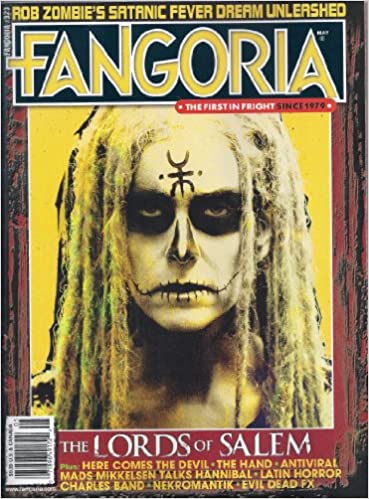
Of course, all the stuff we’re talking about here, the chronic lying, the serial plagiarism, the self-aggrandizement and the malignant smear campaigns are all consistent with a garden variety of Narcissistic Personality Disorders although I assure you, Spiderbaby and Alexander are not unique manifestations of any of this within the horror journalism realm. Spiderbaby isn’t even the only serial plagiarist out there. She’s just an extreme case who had the misfortune of getting caught. During my tenure in that ridiculous circus of a sub-culture, I’ve encountered an inordinate number of these types of individuals. I don’t know why, perhaps many of them were neglected as kids, or never felt cool enough in high school, but I suppose the idea of circulating in a culture that gives them close and intimate access to a number of famous personalities is highly seductive and helps fuel their grandiose fantasies of success and elevated social status.
Word to the wise though: if you ever cross paths with one of these poisoned souls, and there’s a lot of them out there so chances are you already have, and you catch them red-handed doing their dirty deeds, don’t be like me and expose them publicly, especially if they hold an influential position and surround themselves with desperate sycophants who gleefully gobble down whatever crazy Koolaid they’re dishing out. They will retaliate and smear, and it could hurt your reputation and disadvantage you in your line of work. My problem is, I don’t care about those things, or at least, I don’t care about them enough. To use an extreme but colourful analogy, it’s a bit like when Nicky Santoro explained to Charlie the Banker why he was going to repeatedly smash his brains in: “‘Coz I’m fuckin’ stupid. I don’t give a fuck about jail. That’s my business. That’s what I do.”
And the way I see it, anyone who’d fall for a pathological liar’s frantic and factless smear tactics is an intellectually diminished, drooling dolt and as I make it my life’s work to get as much distance between myself and such individuals as possible, I consider it fortuitous as much as anything if such a campaign burns a bridge between me and them. Exposing their leader is like chopping off the head of the Night King and watching the rest of the ice zombies crumble into dust.

Where I eventually had to agree with the Gore-met in his criticisms of Women in Horror Month (and thankfully I had that conversation with him long before he passed away) was that the observance was being largely exploited, not so much to celebrate and empower the unsung female contributors and pioneers of the genre, but as a pretence for mediocre talents to self-promote and boost their social media profiles. We saw that with stark clarity in the case of Spiderbaby herself who, long after it became apparent that something was rotten in the state of Denmark, was continuously promoted by the Women In Horror contingent right up until the moment of her public downfall. I imagine her close association with a legendary movie director proved far too seductive for her sycophantic acolytes to resist.
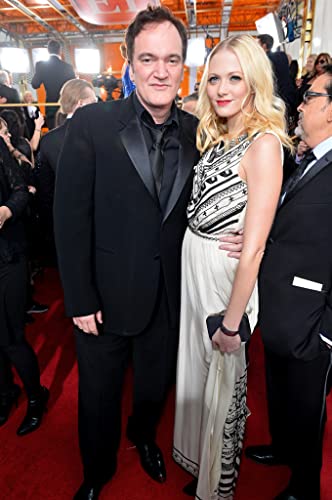
Now that we’re many years away from this weird chapter in horror journalism history, and we’re all much older, wiser and more mature (or at least more fatigued), I’ve often toyed with the idea of doing an intensive radio breakdown and analysis of the entire Spiderbaby / Alexander / Fangoria debacle. There’s so many threads to pull at and the whole situation opens up a wider discussion into the frailty of a pseudo-capitalist society that has imploded into social media induced influencer narcissism, chronic cognitive dissonance, polarized political tribalism and the deplorable state of “journalism” in general. Plus, it could be very cathartic and lots of wicked fun, especially now that I have no one to protect other than myself and I no longer care what any of these chones have to say about me.
Then again, maybe all that time and energy could be directed into subjects more worthy of attention, but however it pans out, I do hope to get my hands on that Fango editorial again. There’s a lot of good stuff in there.
In the meantime, please enjoy this blast from the semi-distant past: part two of my final radio conversation with the one and only loveable curmudgeon himself, the Gore-met.
RIP Andrew Bailes (1966-2019)
:- FDBK
‘Right Click’ (PC) or ‘CTRL-Click’ (Mac) here to download a copy to your hard drive.
Discuss this episode on The Mortuary or Chonebook. Or send an email to info@cinephobia-radio(dot)com.
